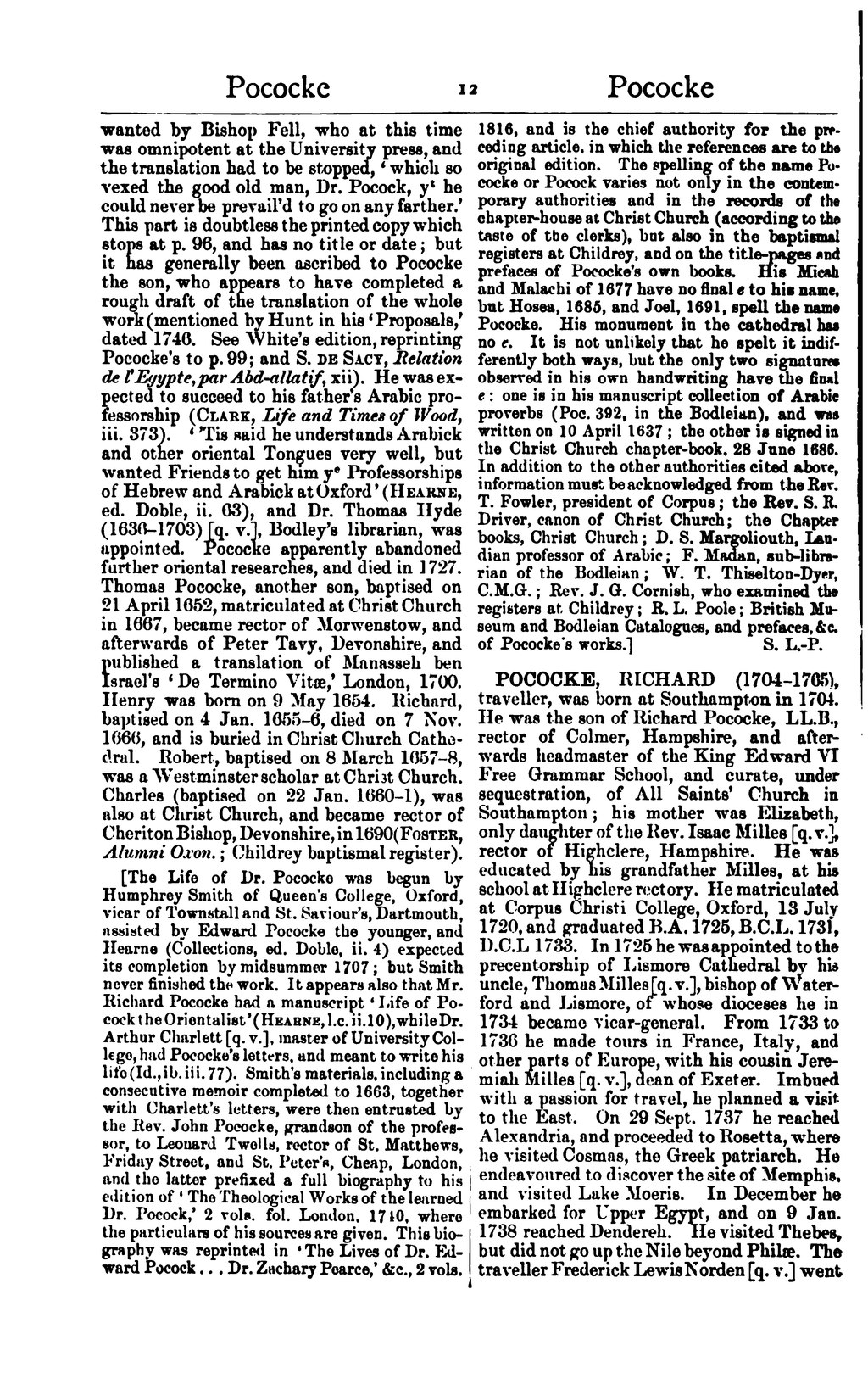wanted by Bishop Fell, who at this time was omnipotent at the University press, and the translation had to be stopped, ‘which so vexed the good old man, Dr. Pocock, yt he could never be prevail'd to go on any farther.’ This part is doubtless the printed copy which stops at p. 96, and has no title or date; but it has generally been ascribed to Pococke the son, who appears to have completed a rough draft of the translation of the whole work (mentioned by Hunt in his ‘Proposals,’ dated 1746. See White's edition, reprinting Pococke's to p. 99; and S. de Sacy, Relation de l'Egypte, par Abd-allatif, xii). He was expected to succeed to his father's Arabic professorship (Clark, Life and Times of Wood, iii. 373). ‘'Tis said he understands Arabick and other oriental Tongues very well, but wanted Friends to get him ye Professorships of Hebrew and Arabick at Oxford’ (Hearne, ed. Doble, ii. 63), and Dr. Thomas Hyde (1636–1703) [q. v.], Bodley's librarian, was appointed. Pococke apparently abandoned further oriental researches, and died in 1727. Thomas Pococke, another son, baptised on 21 April 1652, matriculated at Christ Church in 1667, became rector of Morwenstow, and afterwards of Peter Tavy, Devonshire, and published a translation of Manasseh ben Israel's ‘De Termino Vitæ,’ London, 1700. Henry was born on 9 May 1654. Richard, baptised on 4 Jan. 1655–6, died on 7 Nov. 1666, and is buried in Christ Church Cathedral. Robert, baptised on 8 March 1657–8, was a Westminster scholar at Christ Church. Charles (baptised on 22 Jan. 1660–1), was also at Christ Church, and became rector of Cheriton Bishop, Devonshire, in 1690 (Foster, Alumni Oxon.; Childrey baptismal register).
[The Life of Dr. Pococke was begun by Humphrey Smith of Queen's College, Oxford, vicar of Townstall and St. Saviour's, Dartmouth, assisted by Edward Pococke the younger, and Hearne (Collections, ed. Doble, ii. 4) expected its completion by midsummer 1707; but Smith never finished the work. It appears also that Mr. Richard Pococke had a manuscript ‘Life of Pocock the Orientalist’ (Hearne, l.c. ii. 10), while Dr. Arthur Charlett [q. v.], master of University College, had Pococke's letters, and meant to write his life (Id., ib. iii. 77). Smith's materials, including a consecutive memoir completed to 1663, together with Charlett's letters, were then entrusted by the Rev. John Pococke, grandson of the professor, to Leonard Twells, rector of St. Matthews, Friday Street, and St. Peter's, Cheap, London, and the latter prefixed a full biography to his edition of ‘The Theological Works of the learned Dr. Pocock,’ 2 vols. fol. London, 1740, where the particulars of his sources are given. This biography was reprinted in ‘The Lives of Dr. Edward Pocock … Dr. Zachary Pearce,’ &c., 2 vols. 1816, and is the chief authority for the preceding article, in which the references are to the original edition. The spelling of the name Pococke or Pocock varies not only in the contemporary authorities and in the records of the chapter-house at Christ Church (according to the taste of the clerks), but also in the baptismal registers at Childrey, and on the title-pages and prefaces of Pococke's own books. His Micah and Malachi of 1677 have no final e to his name, but Hosea, 1685, and Joel, 1691, spell the name Pococke. His monument in the cathedral has no e. It is not unlikely that he spelt it indifferently both ways, but the only two signatures observed in his own handwriting have the final e: one is in his manuscript collection of Arabic proverbs (Poc. 392, in the Bodleian), and was written on 10 April 1637; the other is signed in the Christ Church chapter-book, 28 June 1686. In addition to the other authorities cited above, information must be acknowledged from T. Fowler, formerly president of Corpus; the Rev. S. R. Driver, canon of Christ Church; the Chapter books, Christ Church; D. S. Margoliouth, Laudian professor of Arabic; F. Madan, sub-librarian of the Bodleian; (Sir) W. T. Thiselton-Dyer, K.C.M.G.; Rev. J. G. Cornish, who examined the registers at Childrey.]
POCOCKE, RICHARD (1704–1765), traveller, was born at Southampton in 1704. He was the son of Richard Pococke, LL.B. (1660–1710). His grandfather, also Richard Pococke, LL.B., was rector of Colmer, Hampshire, from 1660 to his death in 1719. His father was headmaster of the King Edward VI Free Grammar School, and curate, under sequestration, of All Saints' Church in Southampton; his mother was Elizabeth, only daughter of the Rev. Isaac Milles [q. v.], rector of Highclere, Hampshire. He was educated by his grandfather Milles, at his school at Highclere rectory. He matriculated at Corpus Christi College, Oxford, 13 July 1720, and graduated B.A. 1725, B.C.L. 1731, D.C.L 1733. In 1725 he was appointed to the precentorship of Lismore Cathedral by his uncle, Thomas Milles [q. v.], bishop of Waterford and Lismore, of whose dioceses he in 1734 became vicar-general. From 1733 to 1736 he made tours in France, Italy, and other parts of Europe, with his cousin Jeremiah Milles [q. v.], dean of Exeter. Imbued with a passion for travel, he planned a visit to the East. On 29 Sept. 1737 he reached Alexandria, and proceeded to Rosetta, where he visited Cosmas, the Greek patriarch. He endeavoured to discover the site of Memphis, and visited Lake Moeris. In December he embarked for Upper Egypt, and on 9 Jan. 1738 reached Dendereh. He visited Thebes, but did not go up the Nile beyond Philæ. The traveller Frederick Lewis Norden [q. v.] went
